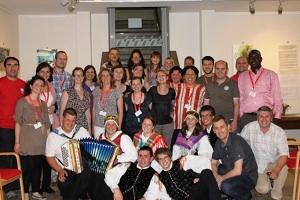
Participants of the two day seminar on climate justice for Caritas organisations from new European Union member countries
Credits: Caritas
By Christine Campeau, Caritas Internationalis
“Two people are in a desert in a car with a flat battery and a bag of gold on the back seat,” said Domen Grgic, Slovenia’s Ministry of Foreign Affairs. “Both hesitate in deciding who will push and who will steer, because they worry that whoever stays in the car will run off with the gold when it starts.”
This he says is the mistrust he sees when dealing with international climate change negotiations. The minister was a guest at a unique climate justice event in Celje, Slovenia on 8 June for Caritas organisations from new European Union member countries.
The two-day seminar brought delegates from 17 Caritas members together. They focused in particular on the impact of climate change in developing countries, especially in Africa.
Caritas Switzerland’s Christian Varga said, “Humanitarian work will change substantially due to the effects of climate change in the South as well as the North”. Caritas Senegal’s Marcellin Ndiaye told delegates how climate change and a lack of investment in the agriculture was trapping people in poverty.
“It warms my heart to know that new EU Caritas members care about what is happening in Senegal,” he said.
Alexis Barnett of Caritas Scotland (Sciaf) shared her experience of working successfully with other Scottish NGOs to mobilise public opinion and lobby lawmakers. She stressed the importance of working with others, presenting one strong voice and involving church leaders to bring a moral argument for action.
One topic that affects new EU Caritas members is the EU’s position on the mitigation. Caritas members are advocating for increased momentum in the run up to the June Environment Council in order to reach a commitment of a 30 reduction by 2020 by the Council of Ministers meeting in December.
Upon hearing the reluctance of the Czech Republic, Hungary, Poland and Slovakia, Iliona Gajdikova of Caritas Czech Republic was inspired to make this her top priority. She promised to unite the Caritas members in these countries to lobby their governments.
Ways to reduce your personal carbon footprints were also shared to inspire others. Slovenia is the second most forested country in Europe and seems far off from the realities of climate change in Africa and elsewhere. Nevertheless, Slovenians plant more than 1.2 million tree seedlings each year.
Caritas Luxembourg presented their examples via a video clip that they emailed to the conference in order to save on carbon emissions emitted in travel.
“I realized that I could be the example for my colleagues by doing the steps to rebuild a green planet” said Katarina Danisova of Caritas Slovakia.
The seminar is part of a three-year awareness raising project with new EU member states. The project is led by Caritas Slovenia in partnership with Caritas Slovakia.
